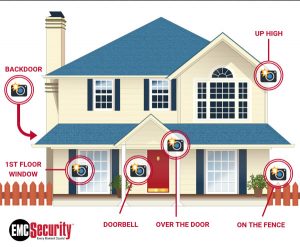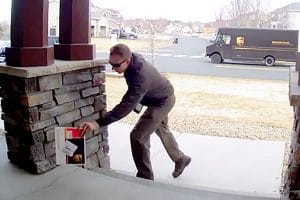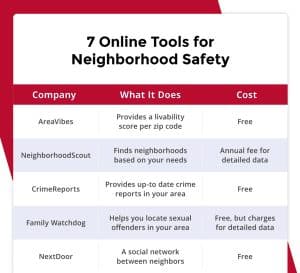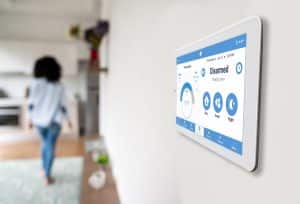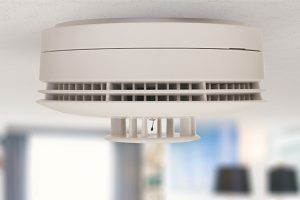Your cart is currently empty!
Category: Homeowner Tips
-

What to do if crime rises in your neighborhood
If you’ve lived in your neighborhood for a while, it’s likely that crime rates have stayed consistent.
But if something has changed recently–perhaps there are more break-ins or robberies in your area–you should take steps to protect yourself and your property.
We’ve put together this list of tips from law enforcement agencies around the country to help make sure that happens:
Don’t leave valuables in your car.
- Make sure your car is locked and that you take all keys out of the ignition when it’s parked, even if you’re locking up for just a few minutes.
- If you have to leave something in the car, put it out of sight and lock your door immediately after getting back into the vehicle—or better yet, go inside with it!
- Never leave purses or wallets in the open or visible through windows or sunroofs; they’re an easy target for thieves.
- Keep anything valuable hidden away from view, such as GPS systems and phones that charge via USB cables–these can easily be taken by someone who knows how to use them (or simply steals them for parts).
Install a home security system
- One of the best things you can do is to install an EMC Security home security system that is monitored 24/7. If someone attempts to break into your home, EMC Security will notify the police for help. They will also inform them if any sensors were tripped so that officers know what they may be walking into when they arrive on scene.
- Security systems come with different types of sensors, but all of them have one thing in common: they detect motion and send alerts to the monitoring company if they sense something suspicious happening around your house or car. You should consider adding cameras so that video footage also gets recorded if an incident occurs while no one is present at home (or while someone is sleeping).
Eyes, ears, and lighting
- While you’re away, keep an eye on your home. A trusted neighbor or friend can check on it daily, or at least once a week. If you live in a gated community, ask your community association to play a role in keeping an eye on homes when the owners are not present.
- If you live in an ungated area, consider adding lighting around your property so that criminals know they’ll be seen if they come into your yard at night. You may want to install motion-activated lights and cameras outside your home so that anyone entering the property can be seen clearly by neighbors or passersby.
Lock the doors and windows to your house at all times.
- Never leave keys in the locks of your car, even if you’re just leaving it for a few minutes.
- If you have a garage, make sure it’s locked when not in use.
Use timers to make it look like someone’s always home
- You can use timers to make it look like someone is home when they’re not. Set lights to turn on and off at different times of the day, so it looks like there’s activity going on in your house. If you have a security camera, set it up to turn on and off every few minutes so neighbors think you’re always watching what’s happening outside.
- If you’ve got a TV or radio with a timer, use that too: set it to turn on at different times of the day so neighbors think someone is listening to music or watching TV while they’re at work during the day.
Install a security camera in your front yard or close to your doorbell
- You can easily install a security camera near your front door. Many of these cameras are small and inconspicuous. They connect to Wi-Fi and can be monitored from your phone or computer, so you’ll always know when someone is at your door.
Be vigilant.
- If you see something suspicious, it’s important to be aware of what’s happening around you and let neighbors know if they haven’t already called the police. While most neighborhood watch programs simply encourage members to call the police if they notice anything suspicious, some are more involved—they may even send emails about potential crime trends or tips on how to keep your home safe. If your program doesn’t have this level of involvement, consider starting one yourself!
You can take steps to help prevent crime from happening in your neighborhood.
- Get to know your neighbors. People who are well-known in their communities and have good relationships with their neighbors are often the first to hear about suspicious activity in their neighborhood.
- Report all suspicious activity immediately. If you see or hear something that makes you feel uncomfortable, report it to the authorities—and I promise, the police don’t bite!
- Keep valuables out of sight, secure them in a safe place (a strong box is ideal), and never leave them unattended outside even for a moment—if someone sees them lying around unsecured they’re more likely to try stealing them! And remember: if they can’t see it then they won’t bother trying anything with it either!
It’s important to take steps to protect yourself and your family. If you see something suspicious going on in your neighborhood, don’t be afraid to report it! You should also keep an eye out for things like burglaries or robberies happening around town.
-

How to Determine if Your Neighborhood is Safe
When you’re moving to a new city, one of the first things you should do is get to know the area, specifically how safe certain areas are versus others.
Below are some ways to determine how safe your neighborhood is:
The FBI’s crime statistics are free, easy to access and reliable. The statistics are available for every neighborhood in the U.S., as well as for each state. To access the data, go to “Crime in the United States” on the FBI website and select your state from the drop-down menu. You can then click on “Part One: Violent Crime.” This will give you information about crimes committed within your state, including murder rates per 100,000 people (the higher this number is, the more dangerous your city or town is) and property crimes (such as burglary). Click here for home security system information).
Many websites provide crime statistics. Below is a chart of a few to try.
Real estate apps are a great way to get a feel for a neighborhood’s safety. They allow you to look at the crime rates, property taxes, and schools of neighborhoods in your area. This way, you can make an informed decision about where you want to live based on what is important to you. Want to learn about the safest cities in Georgia? Click here.
Property taxes are a reflection of the value of the property. If your neighborhood’s property values are low, it may be due to an overabundance of crime or lack of economic stimulation. Similarly, if there is a lot of crime in your area and no one wants to live there, then you should also consider whether or not it is safe for you as well. Property taxes are based on the value of the property so they can be used as an indicator as to whether or not a neighborhood is safe or not.
Evaluate your local police department or sheriff’s office. A great way to determine whether your neighborhood is safe is to take a good look at the police department or sheriff’s office. Is there a good response time? How often do they post information about crimes in your area on social media, and how quickly do they respond to public concerns via those platforms? Do they host community outreach programs, like “Coffee with a Cop” events where residents can meet members of law enforcement face-to-face and ask questions about how best to stay safe in their communities?
Consider whether or not there are any organizations in your community designed specifically around improving public safety or reducing crime rates—such as Neighborhood Watch groups—and join them if they seem like they might be right for your family.
Look around. Are their well-lit streets? How close are local parks, trails and schools? Chances are, if they are nearby, the area is on the safer-side. Check the “walk score”.
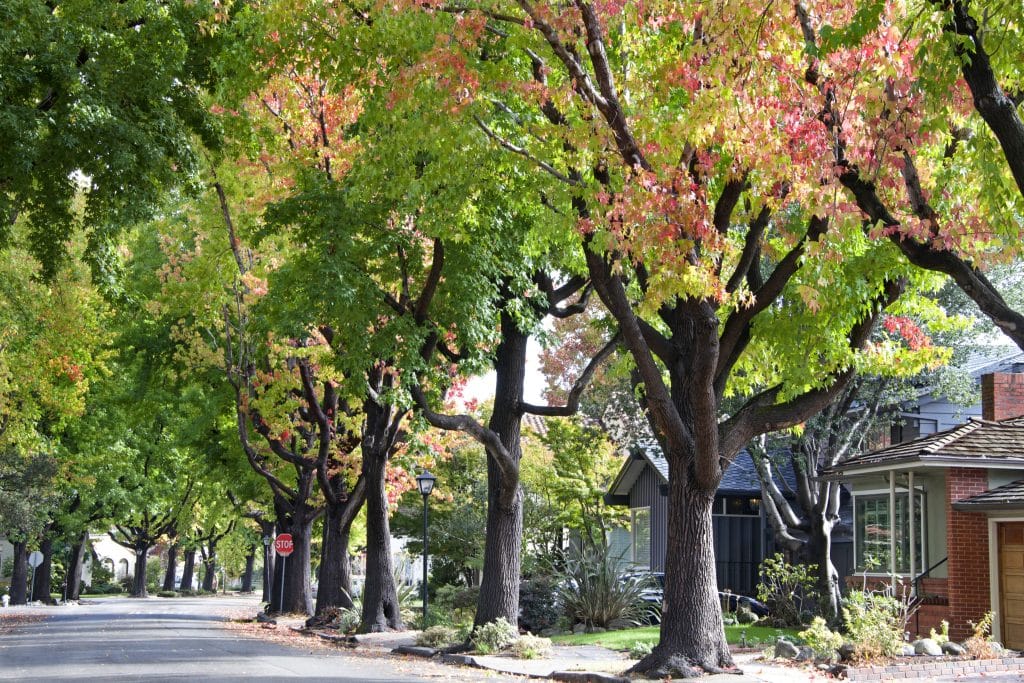
The best way to determine whether your neighborhood is safe is by talking to people who live and work in the area. Ask them about their experiences with crime and if they have seen any suspicious activity in the neighborhood. If you find out that crime is a problem, ask them what they think could be done to help make it safer.
For example: “Hey Tom! How’s everything going?”
“Oh not too bad,” he said. “I was just wondering if anyone else here has had any trouble lately.”
“No, I’m fine,” Tom said with a smile on his face but then he looked down at his feet and shook his head slightly before looking back up at me again and saying, “but I know some people who have had some problems.”
No matter where you end up, be diligent and research first so you don’t make a decision you’ll regret.
A great way to get peace of mind is with a monitored security system from EMC Security. Click here to get a quote today!
-

How to reduce homeowners insurance premium
Homeowners insurance isn’t something you buy every day, and therefore it’s easy to forget about in the midst of other financial priorities.
But if you’re interested in reducing your homeowners insurance premium, here are some tips for getting started:
1. Improve your home security.
The best way to lower your homeowners insurance premium is to improve the security of your home, which can be done in several ways:
Install a security system. The most effective way to secure your home and reduce the risk of break-ins is by installing an alarm system that will notify you if someone enters or tries to enter your property without permission. A great deal of modern alarm systems are wireless, so they can be installed quickly and easily without needing an electrician or other professional help.
Fire alarms and smoke detectors. If you have a fire alarm and/or smoke detector in your home, make sure that it’s working properly and recharge the batteries every six months to two years. Also, be sure that everyone in the house knows how to use the system—and test it regularly!
Better still, install EMC Security monitored smoke detectors – montored 24/7. You might even see higher dicsounts on homeowneers insurance. To discuss your options, call 770-963-0305.
Fire extinguishers. You should also have a fire extinguisher—but don’t just pick one up at Home Depot (unless you want an industrial-sized tank). Instead, speak with an expert about what type of extinguisher is right for your needs: whether you want something easy to carry around or something more powerful; whether it’s necessary to buy two different types of extinguishers; how much maintenance they require on average (and know how often this will come up); etc.
2. Shop around.
The first thing you should do when shopping for homeowners insurance is to get quotes from multiple companies. Don’t assume that the first company you call will give you the best quote, and don’t assume that the insurer with the lowest quote is a good choice for your needs.
3. Bundle up your policies with the same insurer.
If you’re considering bundling your policies with the same insurer, you should know that insurance companies charge more for bundled policies than they do for single-policy coverage. However, this can still provide a great benefit to consumers who want to save money on their homeowners insurance premiums by bundling multiple insurance policies together.
Bundling can be an especially good option if you have other types of insurance (such as car or health) with the same company as well. By maintaining all your policies with one insurer, you may qualify for additional discounts and savings on other coverages.
Additionally, because both parties enjoy lower administrative costs when dealing with only one policyholder at a time, this could also help them offer lower rates overall – which will save you both money in the long run! If nothing else convinces you to bundle up your various types of coverage into one contract (or at least keep them all under one roof), then consider this last bit of advice: Often times it’s easier to bundle when there are multiple people listed on an application; therefore if everyone who lives within a household were listed under one account holder’s name instead of being spread out amongst different individuals’ names then chances are better that applicants’ credit scores would improve over time due to consistent usage history across different accounts.”
4. Increase your deductibles.
A deductible is the amount of money you’ll pay for an insurance claim before your insurance company pays anything. For example, if your car is damaged in a collision and needs $2,000 worth of repair work, with a $500 deductible then you would pay $500 before the insurance company covers any additional costs.
You can get discounts on premiums by increasing your deductibles to lower levels. If you decide to increase them beyond what’s normally recommended by insurers and state law, keep in mind that doing so will mean more out-of-pocket expenses should something happen to your home or car. But if this is something you’re willing to accept as part of lowering your homeowner’s insurance premium costs (and we wouldn’t blame you), then go right ahead!
If you’re looking for ways to save money on your homeowners insurance premium, there are a lot of options out there. We hope this article has helped you find some that are right for your situation and budget!
-

How do most burglars break into a home?
Burglars are clever, opportunistic criminals who make a living off of breaking into homes and businesses.
They’re the reason you should lock your doors, turn off your lights when you leave your house and call the police if you see something suspicious happening. Burglars tend to target homes that have easy access points or no obvious signs of security.
Although there are many ways burglars can break into a home, here are some of the most common:
An open window or an unlocked door is enough for a burglar to break in.
The most common way to break into a home is through an open window or unlocked door. Burglars don’t want to work hard, so they’ll look for the easiest way in. Sliding glass doors are especially vulnerable to burglaries because they can be forced open from the outside by pushing on them with enough force. Alarm systems and cameras are effective deterrents, as is landscaping: hiding your house behind bushes and trees makes it difficult for burglars to access your property without being seen.
Burglars are lazy.
They want to get in and out of a home as quickly and easily as possible, without attracting attention or getting themselves into trouble. If they find a home that appears easy to break into and doesn’t look like it has anyone inside, they will usually take their chance on it.
If you make your house look occupied when you’re not there, the burglar might think he’s been spotted and move on to the next house where there’s no one around.
Most burglars break into your home through the front door.
This is because most people don’t lock their doors, and many homes have open windows. You can make it harder for burglars to get in by using security systems, having a dog that barks when someone is near the house, or leaving lights on at night.
Sliding glass doors can be easy to force open.
Sliding glass doors are a popular entry point for burglars because of the ease with which they can be forced open. Sliding glass doors are often secured with a simple latch, rather than a deadbolt or other lock that requires more effort to open. It is possible to secure your sliding glass door in such a way that it cannot be opened from the outside without some sort of key or code, but this option is not always available to homeowners.
Landscaping can make a home more vulnerable to burglary.
While you may love your landscaping, it can make your home more vulnerable to burglary. For example, a lush lawn makes it easy for a burglar to hide among the trees and shrubs. If your front door is visible from the street but there are no windows on that side of your house, burglars might choose to break into an entry point on another side where they won’t be seen while doing their dirty work (and they might not even have to break anything at all).
Also consider how easily a spatial layout allows burglars to escape if caught in the act: if there are large open areas between buildings or structures with several exits and entrances, it’s less likely someone will catch them when they’re trying to run away after breaking in or stealing something.
Dogs can be both an asset and a liability.
The primary benefit of dogs is that they have excellent senses of smell, hearing, and vision. The downside is that not all dogs are good guards. There are many breeds of dog that make great guard animals; German Shepherds, Rottweilers, Pit Bulls and Dobermans are just a few examples. If you have children or elderly people in your household who need protection from burglars or other threats outside your home (such as wild animals), then you will want to consider one of these breeds if possible.
Alarm systems and cameras are effective deterrents. They can be used to watch your home while you are away, while you are there, or to catch the burglar in the act.
Stats show homes without security systems are 3X as likely to be targeted for burglary. Exterior security cameras deter burglaries even more.
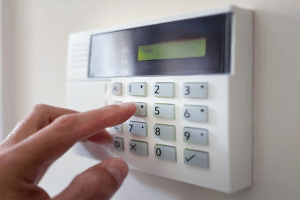
Don’t let criminals into your house! Keep all doors and windows locked, install an alarm system, set up cameras with sensors that detect motion, and get a dog if you can. The more precautions you take now, the less likely it will be for someone to break in later on down the line.
For more information about protecting your home with a security system, call 770-963-0305 or complete this form for a call back.
-

Water damage is the most common insurance claim in the U.S.
Water damage is the most common insurance claim in the U.S. But it’s also one of the most expensive—and it’s getting worse every year.
Water damage claims are increasing because of two main reasons:
- The price of water damage repair has increased
- More people live in homes with more appliances that could cause a leak or flood
Water damage accounts for one out of every five claims to insurers, adding up to $13 billion per year.
If you’re like most people, at some point in your life you’ll experience a leaky pipe or a broken appliance that damages your home. It’s not just costly; it can mean months of inconvenience and stress while you wait for repairs. The good news is that with the right insurance coverage, you can make sure that any water damage claim is handled quickly and professionally.
Below are some facts about the cost of water-related claims:
- Water damage is the most common insurance claim (1/5). According to The National Association of Insurance Commissioners, more than half of homeowners who file claims with their insurer do so because they experienced mold-related issues after experiencing flooding or leaks due to burst pipes or other causes. This adds up to approximately $13 billion in losses annually for insurers!
- The most common insurance claim is water damage, and it affects 15% of homes. Water leaks go undetected for an average of 2,000 hours—that’s more than 75 days! Leaks can cause serious damage to your home and your belongings. According to the Insurance Information Institute (III), a nonprofit organization that provides education about insurance topics to consumers, insurers paid out $19 billion in claims for water damage in 2017 alone.
- If a leak is small enough to be seen, it’s likely too small for you to fix. A quarter-inch pipe leak can waste 10,000 gallons of water a month. What is a quarter-inch pipe leak? It’s the size of one hair strand (about 1/64th inch in diameter). Why does this matter? If the pipe has been leaking for any time at all and not detected, it will have already done significant damage to your home’s foundation or structure. The cost of repairing this type of damage can be high because contractors are often required to excavate around the entire perimeter of your house in order to access pipes buried under concrete slabs and driveways.
- Water damage losses that are unrelated to floods cause over $2 billion in damage annually. According to the Insurance Information Institute, water damage is the most common insurance claim and accounts for one out of every five claims filed with insurers.
What causes water leaks?
There are a variety of causes for water leaks such as frozen pipes, high pressure, corrosion or broken seals. These can be very damaging to your home and could lead to costly repairs. As such it is important that you know the signs and symptoms of these leaks so that you can act fast when one appears in your home.
If you suspect that there may be a leak in your home then here are some things you should check first:
- Check for damp patches on floors or walls, particularly in basements and garages where pipes are often located close to the floor level
- Listen for sounds emanating from plumbing fixtures such as running taps or toilets flushing continuously
Average cost
According to the Insurance Information Institute, the cost for water damage repair is around $7,000 per claim. While an average cost of $7,000 may seem high, it will vary depending on the severity of your property’s damage and whether or not a fire was involved. For example, if your roof collapsed due to a heavy snowfall and caused water damage to all floors below it (including furniture), this would be categorized as “catastrophic” and could easily reach up to $100k+.
Insurance companies may offer coverage for some situations but not others. For example if your home has been flooded due to heavy rain then it may be covered under your homeowner’s insurance policy depending upon how much you pay in annual premiums each year
What can I do?
When it comes to water leaks, prevention is always better than a cure. EMC Security offers a device called a Water Bug. This little guy is placed on the floor near an older toilet, water heater, and any where you want to make sure to detect a leak immediately. If the water bug detects moisture, it will notify your security panel and the keypad will send you a signal. You will also be notified on the mobile app if applicable.
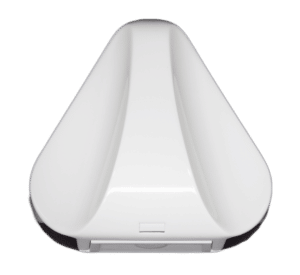
You can also install a Smart Home Water Monitor. After installing the easy-to-use Water Monitor and the mobile app, you’ll be able to monitor your water consumption in real time. That means if the toilet is running, the faucet is dripping, or the water heater is leaking, you’ll know immediately, not when you get that hefty bill at the end of the month.
You will also be notified if there is any sudden increase in water flow, alerting you to any emergencies, and allows you to track your water use over the months and years.
- Get real-time consumption alerts
- No recurring fees or monitoring costs
- Easy installation – no tools or pipe cutting
- Single device monitors the entire home
- Track historical water usage
- Integrates with Amazon Alexa
Water leaks are a serious problem for homeowners, but this doesn’t mean that you shouldn’t take action if you suspect one in your home. If you have any questions about preventing water damage, please contact us today!
-
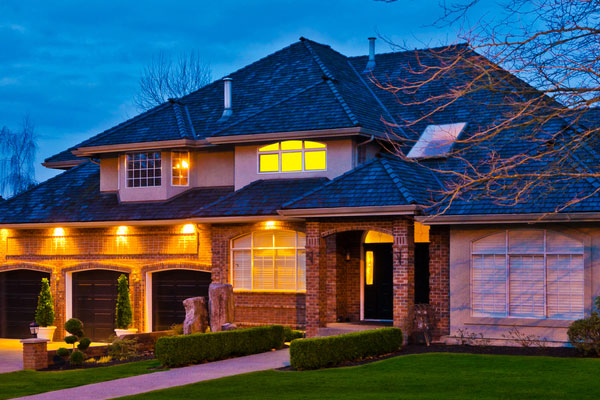
How to protect yourself against crime in your neighborhood
Yes, some cities have higher crime rates than others, but even in the worst neighborhoods you can take steps to protect your property from theft and other crimes.
Here are some tips for keeping your home safe:
1. Pick up the newspaper in your driveway so it doesn’t alert criminals that you’re not home.
Picking up the newspaper in your driveway may seem like a simple gesture, but it can actually help you protect yourself against crime. Criminals are often looking for signs that no one’s home—and newspapers are a dead giveaway of such. By picking up your newspaper and putting it inside, you’re telling criminals that someone is at home and will notice suspicious activity around their house (or, more likely, apartment building). This is especially important if you live in an area where newspapers are delivered by a third party (such as a paperboy) rather than directly from the publisher (in which case there’s usually some sort of sticker on the door letting neighbors know that they don’t need to pick up their own paper).
2. Do not leave spare keys outside—that includes hiding them under doormats or other places where they can easily be found by criminals!
3. Keep your shrubs trimmed so burglars can’t hide behind them.
4. Keep your shrubs trimmed so burglars can’t hide behind them.
5. Don’t have shrubs that are too close to the house or windows.
Instead, leave space around the house so that if a burglar tries to hide behind it, they will be visible from inside or outside of your home.
6.Don’t leave a spare key outside, especially in an obvious place like under your doormat.
If you want to avoid being burglarized, the best thing you can do is make sure that there’s nothing for a thief to take. If your keys aren’t where they’re supposed to be, then it doesn’t matter how much cash or jewelry you have stashed at home: no one will be able to get in.
That said, here are some basic precautions anyone can take:
Don’t leave keys in your car or on the seat
Don’t leave keys in your mailbox (or any other public place)
Don’t leave keys under a mat (or anywhere else obvious)
Don’t leave them in your glove box while driving around town
Make sure all your windows are closed and locked if you’re going out of town.
If you’re going out of town, make sure to lock all your windows and doors. It might seem unnecessary, but remember that criminals like to take advantage of empty houses. You don’t want an opportunistic thief going through the contents of your home while you’re gone.
Even if you’re just planning on being away for 24 hours or so, it’s important to protect yourself against crime by locking up before leaving. Thieves may think nothing of breaking into a house that looks as if it isn’t occupied—even if they are not able to get in right away. Your best bet is always to take steps beforehand so as not put yourself (or anyone else) at risk when returning from vacationing or business trips.
Don’t keep your valuables hidden in the same spot around the house. It’s a common sense rule, but some people don’t follow it. If you keep all of your valuables in the same spot around the house, then it becomes much easier for criminals to grab them and run. Keep them hidden in different rooms or areas of your home, preferably somewhere that isn’t obvious to anyone who might be casing the joint. You should also consider keeping them in different spots on any given shelf—e.g., if someone finds one hiding place, he’ll be less likely to look elsewhere if there’s another one close by.
Don’t leave your garage door open while you’re running errands or working in the yard. Leaving your garage door open while you’re home is a common mistake. But many burglars prefer to work when homeowners are away from their homes, so leaving the garage door up even for a few minutes could mean giving them an easy opportunity to break in.
If you need to go out for errands or run other quick errands around the house, shut and lock your garage door behind you. That way, if thieves happen to see your car parked in the driveway and notice that your garage isn’t closed, they won’t know what’s waiting for them inside—and they may move on to another area instead of risking confrontation with an armed homeowner who could be nearby.
For true peace of mind, consider installing a home security system, even a basic one.
If you’re not already using a home security system, consider installing one. EMC Security can help you choose the right system for your needs and budget.
A basic home security system is simple to set up and easy on your wallet—usually just a few hundred dollars per year.
If you think an intruder might be coming into your home, having a monitored security system means that the police will contact you as soon as motion is detected in your house or yard. If there’s no response from you after 30 seconds (or another predetermined time period), they’ll contact dispatchers who can send officers out to check on the situation.
-

12 Days of Holiday Safety
The holidays are a time for family, fun, and celebrations. But if you’re not careful, they can also be a time for accidents and injuries. From fires to falls, there are many potential hazards in the home during the holiday season.
That’s why we’ve put together this list of 12 days of holiday safety tips to help you keep your home safe and accident-free this holiday season.
Day 1: Check your smoke alarms and carbon monoxide detectors. Make sure they are working properly and have fresh batteries. Test them by pushing the test button monthly. Many homes and lives are at risk because the smoke detectors were out of batteries.
Day 2: Keep candles away from flammable materials like curtains, furniture, or Christmas trees. Never leave burning candles unattended. Avoid using decorative candles altogether and opt for battery-operated LED candles instead.
Day 3: Inspect your Christmas tree for signs of drying out or needle drop before putting it up. Keep the tree watered and away from heat sources like fireplaces or vents to prevent it from drying out too quickly. When the tree starts to drop needles, it’s time to get rid of it.
Day 4: Don’t overload electrical outlets with multiple plugs and extension cords. This could cause a fire hazard. Use surge protectors instead of extension cords whenever possible. If you must use extension cords, make sure they are not damaged in any way and are rated for the amount of electricity they will be carrying.
Day 5: Prevent accidental fires by making sure all embers are extinguished before going to bed or leaving the house. Never leave fireplaces, wood stoves, or space heaters unattended when in use. Keep a fire extinguisher within reach in case of an emergency.
Day 6: If you’re using a real Christmas tree, make sure it is at least 3 feet away from any heat source like a fireplace, radiator, or space heater to prevent it from drying out and becoming a fire hazard. If you have a fake tree, look for the label “Fire Resistant.” This does not mean the tree won’t catch on fire; it just means it is less likely to do so than other artificial trees without that label.
Day 7: Bring in fresh air by opening windows when cooking or using the fireplace to prevent carbon monoxide buildup in the home. Install carbon monoxide detectors on each level of your home and check them regularly to make sure they are working properly.
Day 8: Keep wrapped gifts out of reach of small children who might be tempted to open them early! Store them in a closet or on high shelves until it’s time to put them under the tree.
Day 9: Choose electric lights instead of real candles when decorating your home for the holidays. If you must use real candles, make sure they are placed in sturdy holders and kept away from flammable materials like curtains or paper decorations. Never leave burning candles unattended!
Day 10: Be extra careful when cooking during the holidays as this is one of the leading causes of house fires. Never leave food unattended on the stovetop or in the oven—stay in the kitchen while cooking! Keep a close eye on deep fryers as well; if they start smoking, turn them off immediately and call 911 if necessary.
Day 11: Keep walkways and stairs clear of snow and ice to prevent slips and falls . . . two more leading causes of injuries during wintertime! Also make sure your sidewalks and driveway are well-lit to avoid trips and falls in the dark evening hours of the day.
Day 12: Use your security system! EMC Security will only receive an intrusion signal when it’s armed. Help prevent regrets this holiday season.
We hope these tips help you have a safe and enjoyable holiday season! From all of us here at EMC Security, Happy Holidays!
-

9 Halloween Home Security Tips
Halloween is a fun time for kids and adults, but it’s also a time when criminals take advantage of the fact that people are out of their homes and busy with Halloween activities. Here are 9 tips to help keep your home secure this Halloween season.
- Keep your outside lights on – This will deter would-be criminals from approaching your home as they will be more visible to neighbors and other passersby.
- Do not answer the door to strangers – If you don’t know the person, don’t open the door. This includes people dressed up in costumes. Ask them to leave a calling card so you can get back to them later.
- Keep valuables out of sight – Don’t give thieves the temptation of an easy score by leaving valuables like laptops, jewelry, or cash in plain sight. Put them away in a safe place before you go out for the evening.
- Lock all doors and windows – Even if you’re just going out for a short while, make sure all doors and windows are locked. An easy way for criminals to gain entry into your home is through an unlocked door or window.
- Set your home security system – If you have a home security system, make sure it is set before you leave for the evening. This will help deter criminals and provide peace of mind while you’re out enjoying Halloween festivities.
- Have someone watch your home – If you can, have a trusted friend or neighbor keep an eye on your home while you’re gone. This extra set of eyes can help identify any suspicious activity around your property.
- Stop mail and newspaper delivery – Nothing says ” Nobody’s home” like a pile of newspapers or uncollected mail at the front door. Be sure to stop delivery or ask a trusted friend or neighbor to collect these items for you while you’re away.
- Use motion sensor lights – These are great for deterring criminals as they will be illuminated if someone approaches your property. Motion sensor lights are also great for saving energy as they only come on when they sense movement.
9 . Bring in any outdoor furniture or decorations – Items like lawn chairs, garden gnomes, and Halloween decorations can be easy targets for thieves looking for something quick and easy to grab. Bring them inside or store them in a shed or garage until after Halloween is over .
By following these tips , you can help keep your family and possessions safe this Halloween season . Enjoy the holiday and happy haunting!
-

Georgia School Bus Law
Many school systems have opted for online learning this fall. But there are also many districts that have offered in-school learning – so buses will be on the roads once again.
It’s important for people to realize how dangerous it can be at bus stops, which is why drivers have a responsibility to make sure students can leave those bus stops safely.
According to law, vehicles traveling in both directions must stop when a school bus is stopped on a road with its lights on and sign out. This applies to two-lane roads, four-lane roads, and roads with a turning lane. The only time you do not have to stop is if there is a median in the road, separating you and the bus. These sections of roadway are usually divided by a grassy area, a paved area, or a concrete wall.
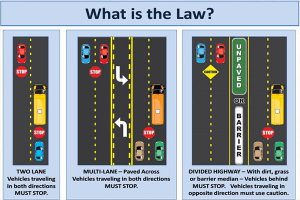
Penalties for Breaking the Law
If you are caught passing a school bus that is stopped, you could be fined up to $1,000 and risk getting six points on your driver’s license. As such, remember, if you see a school bus stopping and the red lights are on, you need to stop unless it’s a road with a median.
According to a school official, bus drivers try to avoid bus stops where students have to cross the street, but it does still happen and sometimes students cross when they aren’t supposed to.
Sometimes, it’s possible that a child might get confused, and not having traffic stopped in all directions could be catastrophic, which is why it’s important that drivers educate themselves on the new law and the cautions that come with driving on the roadways during the school season.
Did you know that EMC Security protects more kids and staff at school in Georgia than any other company? That’s over 358,000 students and staff! Learn how we can keep you and your family safe at home too.
-
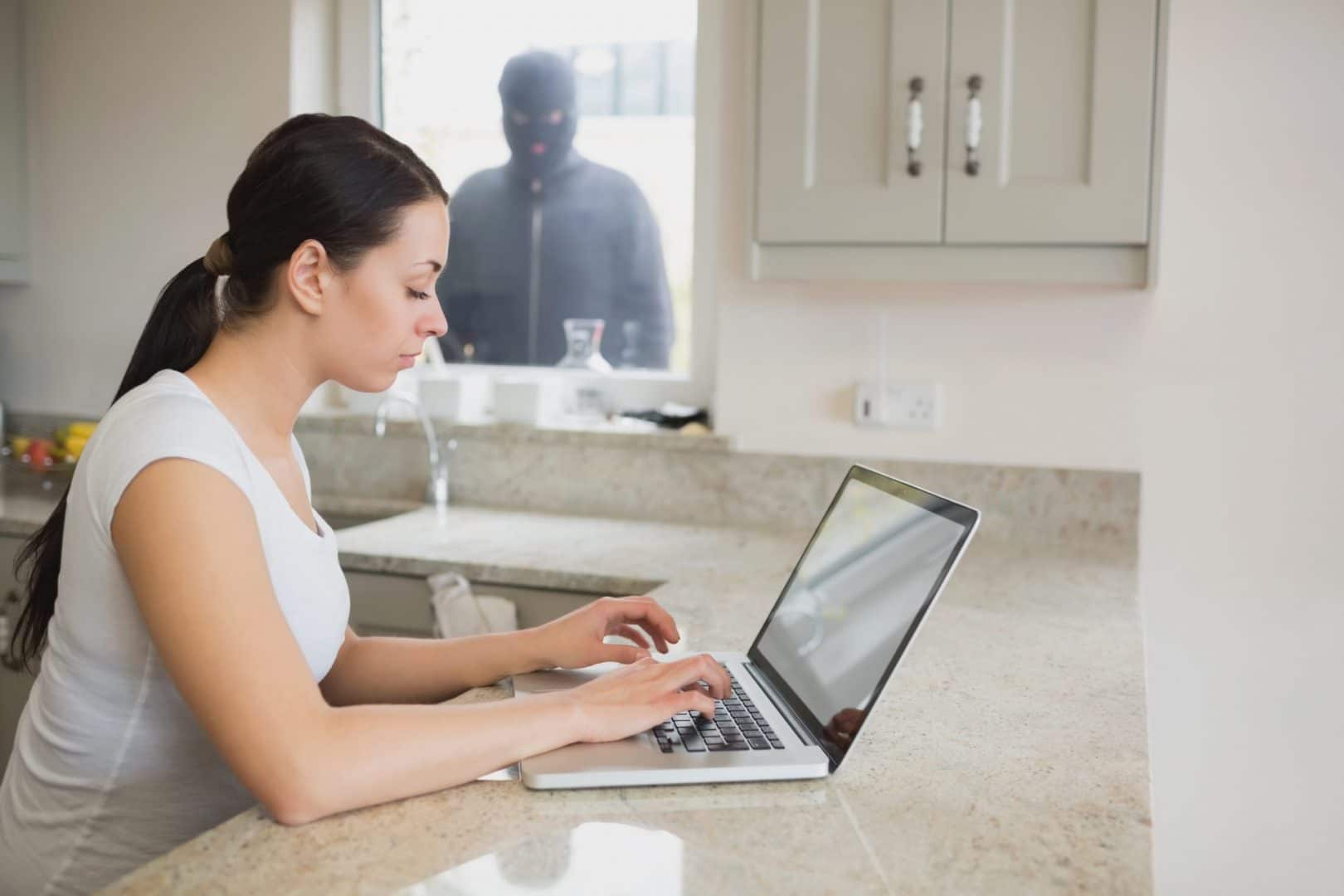
What To Do If You’re Home During a Break In
There’s alot to consider when purchasing a home security system. The doors and windows, cameras, and downloading the mobile app. But one thing you should consider and plan for is – what if the alarm actually goes off when you’re home? What if someone is breaking in? What should you do while the alarm is going off?
No matter what, don’t put yourself in danger. It’s a really bad idea to confront a burglar. You don’t know if they are armed or not
so try to make the safest decisions. Your job is to protect yourself and your family.Here’s how:
- Shh…BE QUIET! Don’t alert the intruder that you are in the house. At this point, the best plan
it to quietly find your phone so you can make some calls.
- If Your Alarm Panel is Nearby (assuming it wasn’t armed), Press the Panic Button. This will make the sirens to go off and will immediately alert the authorities that you need help. It could also scare the burglar off.
- Find a Way to Get Out of There. If you can escape safely, do it. Try and identify where the intruders are and then leave through a door or window as far away from them as possible.
- Lock Yourself in a Safe Room. If you can’t exit your home safely, then lock yourself in a room, barricade the door so that the burglar can’t enter even if they are able to unlock the door.
- Call the Police. If you don’t have a security system or can’t get to the panic button, make the call as soon as possible.
- Wait. Don’t leave the safe room until the police give the all-clear.
What If You Encounter the Burglar?
- Don’t be a Stupid-Hero. Let them take whatever they want as long as they leave you and your family alone. The sooner they get what they want, the sooner they’ll leave. Never try to stop a burglar from taking anything because you don’t want to trigger any violence.
- Don’t provoke them. This can be difficult when you are feeling violated. But don’t initiate physical violence to catch a burglar. Stay as far away from a burglar as possible. You should only fight back if you are attacked.
- Get a good look. As discreetly as possible, take mental notes of their physical features (height, build, hair, eye color, ethnicity, distinct markings) and mannerisms (accent, walking style) so you can provide the details to the police.
Knowing what to do during a home intrusion is vital to your safety and that of your family. By installing a home security system, you could avoid a frightening and potentially life-threatening situation. Contact EMC Security today for a quote and/or free home evaluation at 770.963.0305.
- Shh…BE QUIET! Don’t alert the intruder that you are in the house. At this point, the best plan



